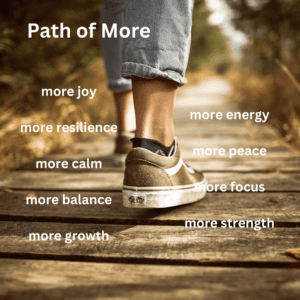Share via:

Feeling like everything is too much? This article shares simple, real-life strategies to help you stay calm when life feels out of control. From breathing tricks to creating your own “Calm Kit,” learn how to find peace one tiny habit at a time.
When everything feels like it’s falling apart—news headlines, rising bills, too many responsibilities—it’s easy to feel like you’re barely keeping your head above water.
Your heart’s racing. Your thoughts are all over the place. You’re trying to stay grounded, but chaos seems to be the new normal.
Sound familiar? You’re not alone.
I’ve had those days too. The ones where it feels like everything is out of control, and all I want is a moment of peace.
The good news? You don’t have to overhaul your life to find calm. A few simple, science-backed shifts can help you feel steadier, even when the world feels upside down.
Why Life Feels So Overwhelming
Between global uncertainty, personal struggles, and daily stressors, we’re carrying a lot. The American Psychological Association has found that chronic stress is at an all-time high.
But here’s the thing: resilience doesn’t mean being unaffected—it means learning how to bend without breaking.
Calm isn’t something we wait for. It’s something we build—one small choice at a time.
How to Stay Calm During Chaos: 5 Grounding Strategies
These aren’t big life changes. These are tiny habits that can have a big emotional impact.
Focus on What You Can Control
When life feels out of control, zoom in. What can you influence right now?
- Your breathing
- Your next meal
- Your bedtime routine
- Who you connect with today
A friend once told me that during a season of divorce and job loss, making her bed was her anchor. “It was the one thing I could do that didn’t feel broken,” she said. That small act gave her a sense of control.
Create a Calm Kit
Think of this like a first-aid kit for your nervous system. It’s a go-to set of comforting things you can reach for when stress spikes.
Ideas for your Calm Kit:
- Cozy blanket or weighted lap pillow
- Calming playlist or white noise
- Pen and notebook
- Herbal tea or a soothing snack
- A small object to hold (smooth stone, worry bead)
- Favorite essential oil (lavender, eucalyptus)
- A list of calming reminders like:
- “You’ve survived 100% of your hardest days.”
- “This moment will pass.”
Breathe Like You Mean It
One of the fastest ways to calm your body is with intentional breathing.
Try this:
- Inhale for 4 seconds
- Hold for 4 seconds
- Exhale for 6 seconds
Do this for just 2 minutes. It sends a signal to your brain that you’re safe.
💡 Research-backed fact: A Harvard study found that just eight weeks of simple mindfulness practices can significantly reduce stress and increase calm.
Limit Doom-Scrolling
We often turn to our phones when we’re anxious—but constant news or social media can make things worse.
Try these boundaries:
- Only check the news once or twice a day
- Set a timer for social apps
- Replace one scroll session with something nourishing: a walk, doodle, or texting a friend
Ask for Help Before You’re in Crisis
We aren’t meant to do life alone. Whether it’s a therapist, friend, support group, or spiritual leader—reach out before you’re drowning.
Talking to someone doesn’t make you weak. It makes you wise.

Real-Life Resilience in Action
These aren’t just theories. Here’s how others have found calm in the chaos:
- Ben, a single dad, started walking every night after dinner instead of watching the news. He says it helped him sleep better and feel more grounded.
- Leila, who was laid off, began each morning by writing down three things she could do that day. “It gave me a sense of power again,” she shared.
- Marco, dealing with anxiety, kept a small stone in his pocket. Whenever he touched it, it reminded him to slow down and take a deep breath.
Small actions. Big difference.
You’re Not Alone—And You’re Not Powerless
Life may feel out of control, but you are not powerless. Calm isn’t something reserved for peaceful people or quiet seasons. It’s something you can grow, right where you are.
You’ve done hard things before. You can do this too.
💬 Try One Tiny Thing Today
Want to start building calm right now? Try one of these:
- Do a 2-minute breathing reset
- Choose one item to add to your Calm Kit
- Text someone just to check in
- Write down one thing you can control today
And if this article helped you, please share it with someone else who might be struggling. Let’s build a more resilient, connected world—together.

FAQs
What’s the first thing I should do when I feel overwhelmed?
Take a deep breath. A 4-4-6 pattern helps signal your body to calm down.
What if I don’t have time for self-care?
Use micro-habits—30 seconds of breathing, 1-minute journaling, or stepping outside for a moment of air.
Can this help with anxiety or panic attacks?
These tips are a great starting point, but professional care is always best if anxiety is frequent or intense.
What’s a Calm Kit?
It’s a collection of items—like scents, textures, sounds, or reminders—that help ground you quickly when things feel chaotic.
How can I stop doom-scrolling?
Set limits on your apps, try a digital detox day, or replace the habit with a healthier one like texting a friend or reading something uplifting.
What is the best first step when I feel overwhelmed?
Take a deep breath and focus on one small thing you can control—like making your bed or drinking a glass of water.
Does deep breathing actually help with stress?
Yes! Research shows intentional breathing lowers heart rate and signals your nervous system to relax.
What if I don’t have time for a full self-care routine?
No problem. Even 30 seconds of intentional breathing or writing down one thing you’re grateful for can shift your mood.
How do I know if I need professional help?
If anxiety or overwhelm is interfering with your daily life, reach out to a therapist or support group. You deserve help.
What are signs I’m reaching my limit emotionally?
Feeling constantly irritable, tired, disconnected, or unable to focus are common signs of burnout or emotional overload.
Can I teach my kids or partner these calm techniques too?
Absolutely. Breathing exercises, calming kits, and even walks are great for families and partners to do together.
What’s a small daily habit that actually helps with stress?
Journaling for 5 minutes or starting your day without your phone can make a noticeable difference in your emotional state.
Does staying calm mean ignoring my problems?
Not at all. Staying calm helps you face your challenges with a clear head and a stronger heart.

Lost in the Noise? Here’s How to Find Real Human Connection Again
Share via: More Everything feels like it’s moving faster, getting louder, and pulling us further apart. With the world in what feels like constant chaos, it’s no wonder so many

How to Build Your Village: Even If You’re Not a “Joiner”
Share via: More Feeling disconnected in today’s chaotic world? You’re not alone. Building a strong personal “village” can provide emotional support, joy, and a sense of belonging. That can be

Mindfulness: Much More Than Just a Buzzword
Share via: More Feeling overwhelmed by life’s nonstop demands? Mindfulness can help. In this article, discover simple, science-backed techniques to slow down, regain control, and build resilience. No complicated routines—just

Mindfulness in Minutes: The Simple Hacks That Actually Worked for Me
Share via: More Mindfulness doesn’t have to mean hour-long meditations or expensive retreats. Sometimes, it’s as simple as taking a deep breath while feeding your dog. In this article, I

The Art of Bouncing Back: How to Build Emotional Resilience Today
Share via: More The world feels out of control, but your emotional resilience doesn’t have to be. Discover how to take charge of your well-being with practical, everyday habits that

The Best Ways to Recession-proof Your Life
Share via: More Recessions can be tough, but you are tougher. In this guide, we dive into actionable ways to protect your finances, strengthen your mindset, and build a recession-proof

Right Now
Take a deep breath
Hold it for 5 seconds
Slowly exhale
Repeat 5 times
What interests you?

Share via:

